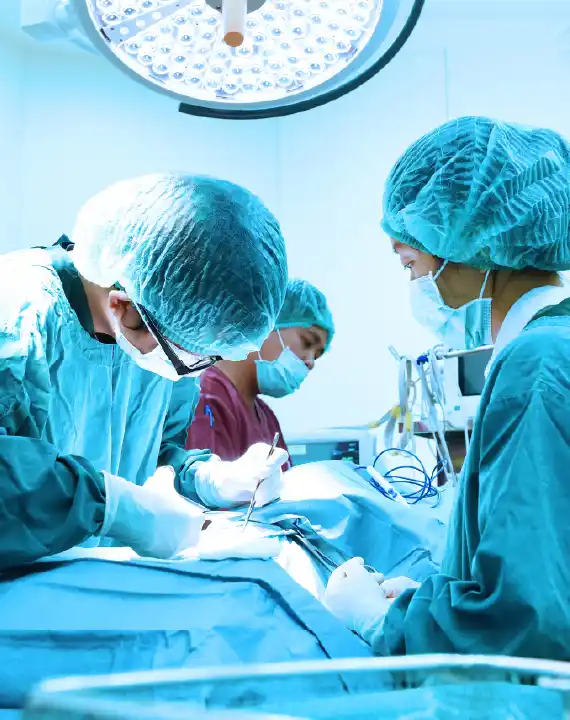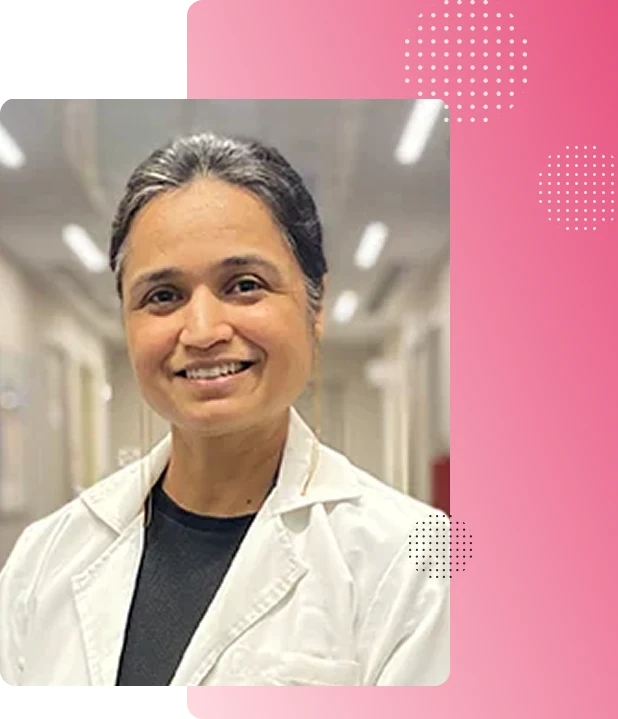Preparation
Pre-surgical evaluation (blood tests, imaging, ECG). Fasting for several hours before surgery.
Performed by Dr Aruna Kalra – Leading Gynaecologist & Robotic Surgeon
A hysterectomy, often called uterus removal surgery, is a significant gynaecological procedure that is done to cure a number of problems with the uterus. This procedure provides long-term comfort when other therapies or treatments don't work, whether it's for fibroids, endometriosis, or chronic pelvic pain.
Dr. Aruna Kalra is a highly skilled and caring gynaecologist who has been doing surgery for close to 3 decades. She specialises in laparoscopic, vaginal, and robotic hysterectomy treatments. If you are considering hysterectomy surgery in Gurgaon, she is the doctor to see. Her method focuses on less intrusive procedures, quicker recuperation, and individualised care to make sure you are comfortable and safe the whole way.
A hysterectomy is a surgery that takes out the uterus (womb). Depending on your condition, the procedure may also involve taking out nearby structures such as the cervix, ovaries, or fallopian tubes. This is a significant procedure for women which must be done after considering all options. Once the uterus is taken out with a hysterectomy, periods stop along with any chances of future pregnancy.
There are many ways to accomplish a hysterectomy, such as laparoscopic hysterectomy, vaginal hysterectomy, abdominal hysterectomy, and robotic-assisted methods. The option relies on the size of the uterus, the ailment you have, and your general health.
Keep in mind that a hysterectomy is usually the best option when other therapies haven't worked to ease symptoms. Some common medical disorders that might need the uterus to be removed are:
Dr. Aruna Kalra has been doing these procedures for more than 25 years and weighs in all factors to arrive at the best course of action based on the patient's condition and goals for recovery. The main aim is to provide the best care with the least amount of pain.

A hysterectomy may be necessary for a complicated case of fibroids, a tumour, or even early-stage uterine cancer. Dr. Kalra puts the preservation of women's reproductive health first, but her treatment also focuses on improving her patients' quality of life. Consequently, hysterectomy will be recommended solely when all alternative methods fail to achieve therapeutic success.

A hysterectomy is a serious procedure, so there are significant dangers, such as infection, bleeding, blood clots, or damage to adjacent organs. However, with Dr. Aruna Kalra's competent care, these risks are greatly reduced thanks to advanced minimally invasive surgical procedures and a thorough preoperative evaluation.
Most patients say that regulated medicine for pain management makes them feel much better within a few days. Dr. Kalra gives you clear instructions after surgery to help you heal safely and get your strength back quickly.
Not every condition with the uterus needs surgery. Dr. Aruna Kalra looks at non-surgical or less invasive procedures like the following before suggesting a hysterectomy:
Hysterectomy is only an option if these steps don't work or if the condition is very bad. This makes sure that surgery is always the final and best option.
A hysterectomy is a surgical procedure to remove the uterus, and in some cases, other reproductive organs like the cervix, fallopian tubes, or ovaries. The treatment approach depends on:
fibroids, endometriosis, uterine prolapse, cancer, or heavy bleeding.
total, partial, or radical hysterectomy.
abdominal, vaginal, laparoscopic, or robotic-assisted surgery.
age, medical history, and overall health.
Pre-surgical evaluation (blood tests, imaging, ECG). Fasting for several hours before surgery.
May be done in the lower abdomen, through the vagina, or with small camera-guided incisions.
Incisions or vaginal openings are sutured. Sterile dressing is applied.
Hospital stay usually ranges from 1–3 days (may be shorter with minimally invasive surgery).
Hysterectomy patient experience video
Bringing care, even at midnight.
From complications to confidence — my journey with Dr. Aruna Kalra.
Here are some frequently asked questions
